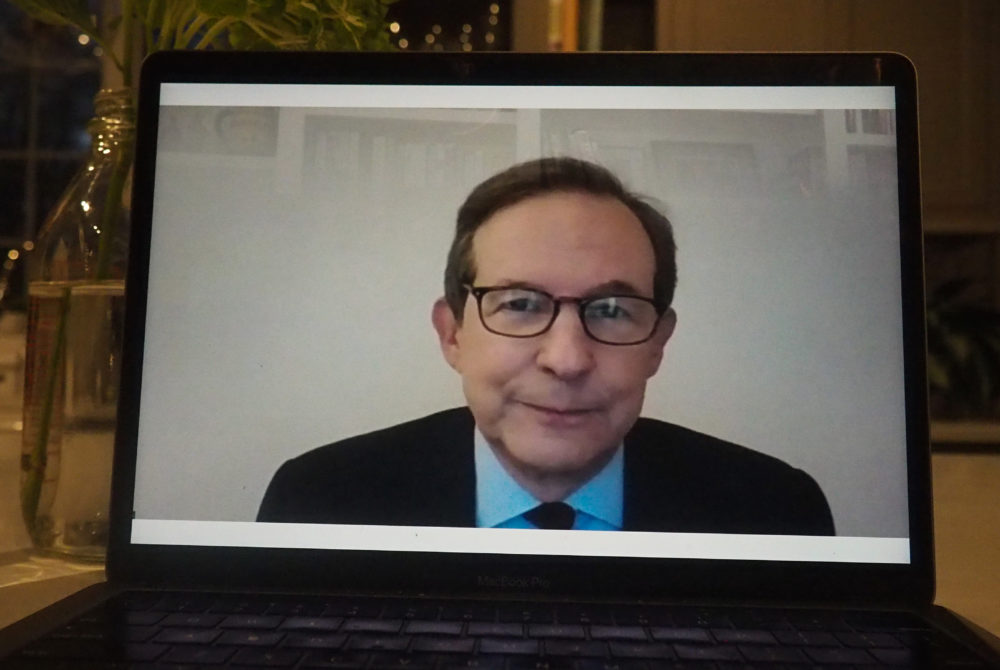
Media Credit: Grace Hromin | Assistant Photo Editor
Wallace said he initially did not prevent Trump from interrupting Biden, seeing their back-and-forth as a good sign of engagement between the two candidates.
The School of Media and Public Affairs hosted a panel Wednesday about the legacy and impact of the 2020 presidential election debates on the final results.
The panel consisted of journalists who served as debate moderators and featured the co-chairs of the Commission on Presidential Debates, who discussed how the debates impacted voters’ decision-making for the election. Frank Sesno, the former SMPA director and former White House correspondent and CNN Washington bureau chief, moderated the event.
Fox News anchor Chris Wallace, who moderated the first debate, said his job as a moderator was to function as a “facilitator” of policy discussion between President Donald Trump and former Vice President Joe Biden.
Sesno said the first debate was widely criticized for both Trump’s frequent interruptions of Biden, as well as Wallace’s inability to effectively moderate the discussion.
Wallace said he initially did not prevent Trump from interrupting Biden, seeing their back-and-forth as a good sign of engagement between the two candidates. But he added that he soon lost control over enforcing the rules of the debate.
“You began to realize that the president had a strategy which he was not going to be dissuaded from, which was to interrupt and try to throw Joe Biden off no matter what I did or Joe Biden did,” he said.
Susan Page, the Washington bureau chief for USA Today and moderator for the vice presidential debate between Vice President Mike Pence and Sen. Kamala Harris, D-Calif., said the role of moderator is “different” from her job as an everyday journalist.
“The goal of an interview is to get some news, to ask something provocative or get something exclusive, but the goal of a debate is to help voters figure out who they want to vote for,” she said.
Page said she failed to ask follow-up questions because she wanted to ensure that both candidates got “roughly the same talking time.”
Frank Fahrenkopf, a co-chair of the Commission on Presidential Debates, said the commission decided for the first time to implement an automatic microphone mute after each candidate’s initial allotted two-minute speaking time for the second presidential debate. He said the commission’s decision was a way to enforce the rules of the debate that candidates had initially agreed to but had violated.
“It was meant to be a tool of discipline,” he said. “We wanted to discipline them so that they had to follow the debate rules and I think it was remarkably successful.”
Kenneth Wollack, another commission co-chair, said each respective candidate had the chance to practice with the mute button during the afternoon before the debate.
He added that the commission’s decision was criticized by Trump as biased, but he believed it was the right thing to do.
“There is not an ounce of partisanship that seeps into the decision-making of the commission,” he said. “We decided to do what was best not only for the moderators but for the viewing public. We stood on principle.”
Kristen Welker, an NBC News White House correspondent and moderator of the second and final presidential debate, said the mute tool “functioned smoothly” and helped set the tone for a good discussion between the candidates by allowing them uninterrupted speaking time to respond to her initial questions.
Welker said she spoke to past moderators like Chris Wallace and Susan Page to ask advice and prepare her questions. She added that she used her contacts as a journalist to speak to American voters from across the country to learn the issues they wanted to hear about.
“I didn’t want the debate to be a Washington debate,” she said. “I wanted it to be a debate that yes, if you are in Washington and are steeped in all of these issues, you felt like you got something from it. But if you were just tuning in for the first time, you could understand what we were talking about.”
"impact" - Google News
November 26, 2020 at 10:33AM
https://ift.tt/39f94w7
Debate moderators discuss impact of debates on election - GW Hatchet
"impact" - Google News
https://ift.tt/2RIFll8
Shoes Man Tutorial
Pos News Update
Meme Update
Korean Entertainment News
Japan News Update
Bagikan Berita Ini














0 Response to "Debate moderators discuss impact of debates on election - GW Hatchet"
Post a Comment